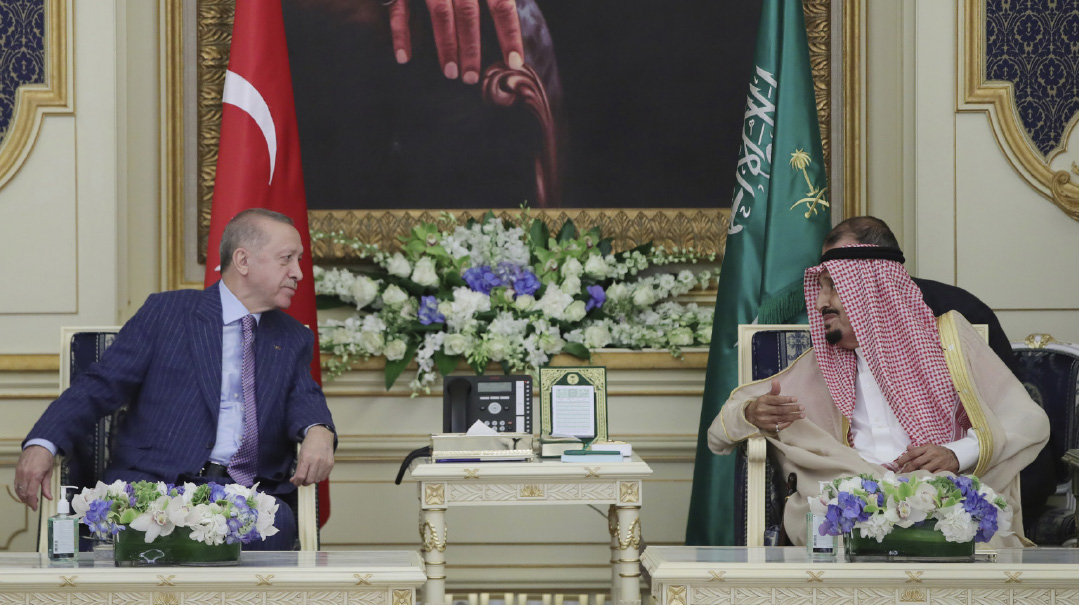North Winds

Does Hezbollah want a confrontation, and can Israel afford to put off a final showdown?
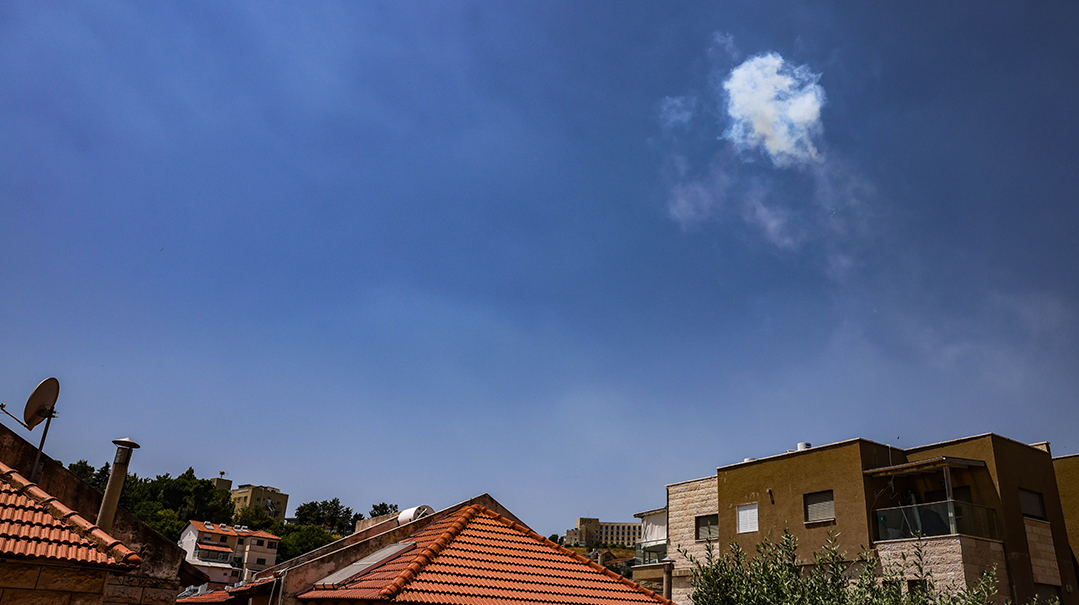
Photo: Flash90
This Can’t Go On
Gedalia Guttentag
How to Defeat the Defeatists
Binyamin Rose
Bombs Away
Ya’acov Lipszyc
A Holy City, Deserted
Chananel Shapira
This Can’t Go On
Gedalia Guttentag
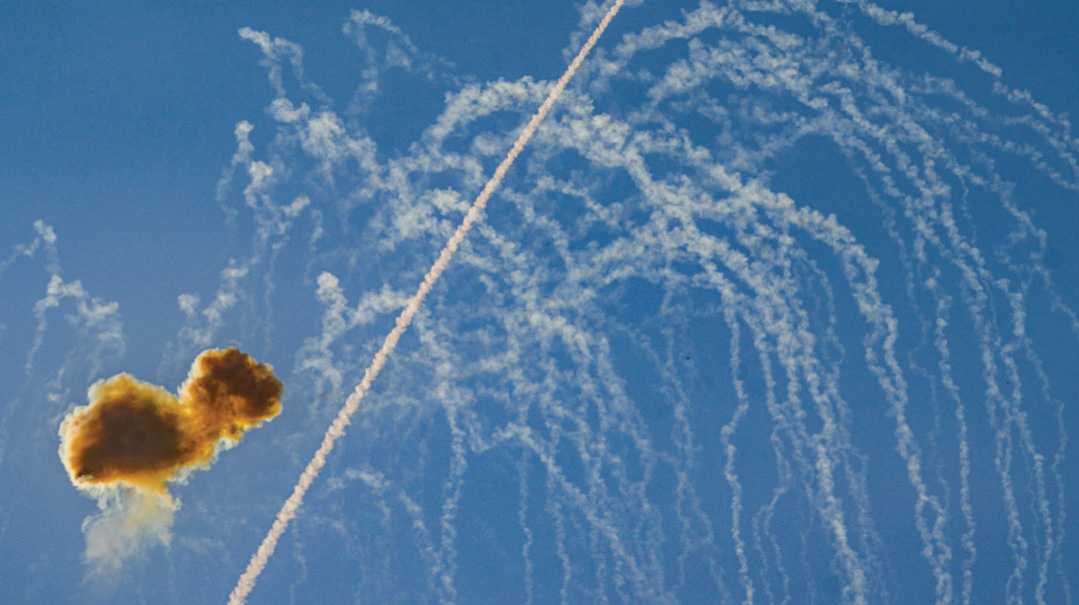
PRIMITIVE, YET DEADLY Can Hezbollah’s rocket arsenal overwhelm Israel’s air defemses? (Photo: Flash90)
“Will there be war?” is the question around every Israeli kitchen table nowadays, as the IDF and Hezbollah trade artillery and drone strikes and the upper Galilee and southern Lebanon burn. From the White House to European capitals, foreign leaders are scared by the possibility of a conflagration that could draw in Iran and upend the Middle East. Lebanese citizens fleeing the country remember the destruction visited on Beirut last time that Hezbollah started a war, but Israelis are well aware of the terror group’s enormous rocket arsenal and battle-tested army. As conflict hovers over Israel’s northern reaches, what are the dynamics shaping the standoff, and is a Third Lebanon War just a question of time?
Hezbollah Hubris
After the failure of Israeli intelligence on the Gaza front that led to October 7, no Israeli analyst will risk a definitive answer to the crucial question of whether Hezbollah is intent on provoking Israel into all-out war, or is happy to keep scoring PR points for baiting Israel, while not risking the destruction of Lebanon that would ensue if war broke out.
“Hezbollah behave like they don’t want all-out war, but we don’t really know their intentions,” says Israel’s former national security advisor Maj. Gen. (res.) Yaakov Amidror, currently a senior fellow at the Jerusalem Institute of Strategic Studies and Washington-based JINSA. “They have achievements in this fighting, including the evacuation of the Israeli population, but we have to remember that more Lebanese have been evacuated than Israelis, which could be a factor in their plans. Remember that Hezbollah’s legitimacy rests on their image as defenders of Lebanon, so the more that citizens suffer, the less they can carry off that image.”
Israel’s Calculus
Unlike Hezbollah, Israel does not want a war, but may need a war, simply because the Hezbollah terror group has made large swaths of the north unlivable with rocket barrages, drone attacks, and the threat of invasion.
“From a military point of view, we need the time to rebuild the army’s capacity and to rest soldiers who have been deployed repeatedly, but in the real world, there are other factors, such as the 80,000 Israelis who are refugees in their own country, away from their homes and education systems,” says Yaakov Amidror.
At this point, it’s clear that it will take a very credible threat of destruction for Hezbollah — and their Iranian masters — to back down. B ut with the IDF still tied up in Gaza — and of insufficient size to fight a two-front war — the stick that Israel wields is not currently big enough to make the Hezbollah dog cower.
Rocket Power
The biggest factor deterring Israeli leaders from unleashing the IDF, though, is the scale of the Hezbollah response.
According to a report by the Center for Strategic and International Studies (CSIS), Hezbollah is the world’s most heavily armed non-state actor. It possesses between 120,000 to 200,000 rockets and missiles, both unguided and guided. The destructive power of its short-range, unguided Burkan rockets has been on display with the demolition of IDF bases around Kiryat Shmona. With an almost-half-ton warhead, what the Burkan lacks in sophistication, it makes up for in mass and numbers: An attack using thousands of these systems could overwhelm Israel’s air defenses and cause mass destruction.
In addition, Hezbollah possesses hundreds of Iranian-made guided ballistic missiles with ranges of up to 300 kilometers, with which it would attempt to hit strategic targets in Israel such as air bases and nodes on the power grid. Added to these capabilities are the terror group’s arsenal of drones and anti-tank missiles. The former are used both in reconnaissance roles, such as the recent overflight of Israel’s Haifa naval port, and in attack roles as suicide drones. The anti-armor capacity using Kornet missiles has proven deadly in Hezbollah hands, just as it was in the Second Lebanon War of 2007.
Home Front
What can the IDF do against this firepower? “The preface to this discussion,” says Yaakov Amidror, “is that the IDF is better prepared for Hezbollah than it was for Gaza. For ten years, the IDF has been training and developing tactics and a huge target bank for a showdown with Hezbollah.”
The CSIS report notes that in the previous showdown with the IDF, the terror group was able to keep firing into Israel until the end of the war. Israeli airstrikes alone couldn’t silence the guns; doing so requires ground troops to destroy the launch pads, like in Gaza. As has become obvious over the last few months, the Iron Dome can’t provide hermetic defense, especially against drones.
“The attacks on Har Meron using anti-tank missiles are worrying, because we don’t have any system to defend against them,” says Yaakov Amidror. “I believe that we’re a few months away from developing an answer. But any system that we deploy won’t provide hermetic defense.”
The nature of that response could include use of rapid-firing air-defense cannons such as deployed on US Navy ships, deployed along the border with Lebanon. While efficient at short-range, they would leave much territory undefended until the deployment of some game-changing system such as the Iron Beam laser system, which is under development.
In the meantime, says Amidror, defense would consist of three layers. One is identifying and destroying missiles in Lebanon before launch. The second is air defenses shooting them down before they impact. A third is Israeli civilians’ access to safe rooms. In other words, in a war with Hezbollah, the home front is also the front line, more than ever.
Made in America
A critical factor in the road ahead is the Americans’ posture. Hezbollah attacked Israel on October 8, presenting Israeli leaders with the dread reality of a two-front war. With the army massing to invade Gaza, the IDF was forced to focus on the northern front as well, rushing forces to the front line to deter a copy-cat invasion by Hezbollah’s elite Radwan troops.
Alongside airlifting weapons to the IDF, America played what was likely a critical role deterring Hezbollah, stationing aircraft carriers with their powerful air wings near Lebanon. But in line with the Biden administration’s waning support for the Gaza campaign, its backing over the Hezbollah threat has given way to an effort to contain Israel’s response rather than deter Hezbollah.
“The situation today with 80,000 Israelis out of their homes is unbearable, and if this continues, then Israel will have no choice but to go to war,” says Yaakov Amidror. “The American failure to achieve any diplomatic solution makes the probability of conflict rise. That can be averted if the Americans make clear to Lebanon that if they don’t reach an agreement with Israel, they’ll back Israel with everything that they need to fight. Only then might Hezbollah consider a diplomatic solution. But the situation today, in which it’s clear that America is urging Israel not to retaliate, weakens Israel’s leverage.”
World Opinion
While the Biden administration tries to prevent a Middle East war in the runup to the November elections, the White House has told the Israeli government that it will guarantee a supply of weapons should war break out, according to a CNN report.
“The world will initially stand with Israel if Hezbollah provokes a war,” says Amidror. “For the first month of the Gaza war, the world was with Israel, and only after the pictures of Gaza’s destruction emerged did the world forget what ignited it. Even then, most decision-makers have remained on Israel’s side. But that should not be the main factor in our calculations. Our main calculation is what our ally the US thinks, and their thoughts are connected to the approaching election.”
Will the IDF need to fight Iran as well as Hezbollah? Given the direct missile attack from Iran in April, a joint attack is a very real possibility.
“It’s not wise to split our force to combat Iran and Hezbollah at the same time if we don’t have to,” says Yaakov Amidror. “It’s clear that if we initiate that type of attack, we’ll lose US legitimacy as well.”
Against the impending threat from the north, was Israel wrong to respond to the Iranian missile attack with a mere rap across the wrists in the form of a pinpoint strike on an Iranian airbase? “The message to the Iranians was, ‘Be careful — we know how to reach sensitive facilities and you have no defense.’ If we don’t want to escalate, this was a good message.”
How to Defeat the Defeatists
Binyamin Rose
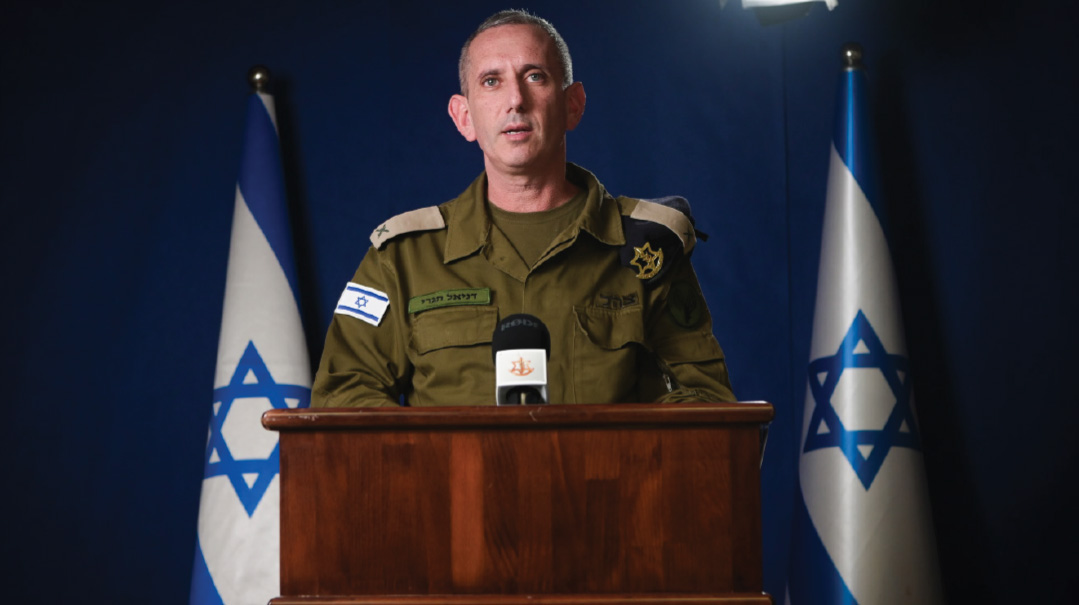
IDF Spokesman Daniel Hagari needs to watch his words (Photo: Flash90)
T
he pessimistic attitudes expressed publicly last week — that Hamas is indestructible, and that Israel could become uninhabitable 72 hours into a war with Lebanon — were unnecessarily demoralizing and provided Israel’s enemies with fodder for their voracious propaganda machine.
IDF chief spokesman Daniel Hagari was the first guilty party.
Hagari, who has been a trusted face of the IDF in the field, providing informative war updates and debunking war crimes accusations against Israel, told Channel 13 (a left-wing media outlet) that “this business of destroying Hamas, or making it disappear, is simply throwing sand in the eyes of the public.”
Had Hagari been expressing his worldview, that would have been bad enough. That’s not his role. If he was conveying the thinking of the IDF brass responsible for winning this war, it’s even worse.
The Prime Minister’s Office reacted, reiterating that the government and the IDF remain committed to the “destruction of Hamas’s military and governance capabilities.” The IDF concurred in a follow-up news release, saying Hagari was only referring to the challenges of eradicating Hamas as an ideology.
Al Jazeera and legions of pro-Hamas and pro-Hezbollah bloggers disregarded those clarifications. They pounced on Hagari’s original quote, disseminating it widely as the IDF’s admission that Israel was losing the war.
The second offender was Shaul Goldstein, CEO of the National Electrical System Management Company. Addressing an Institute for National Security Studies conference in Sderot, Goldstein warned that Hezbollah rockets could disable Israel’s power grid in a full-scale war and that “living in Israel would be impossible after 72 hours without electricity.”
Meir Spiegler, CEO of the Israel Electric Corporation (IEC), pushed back immediately. He called Goldstein’s comments “irresponsible, detached from reality, and spreading unnecessary panic among the public.”
The IEC has backup generators to restore power to locally affected areas within seven minutes of an outage, even if they admit that they can’t guarantee that nationwide. Minister of Energy Eli Cohen also calmed nerves, noting that Israel has gas rigs, coal and diesel fuel reserves, and renewable energy above ground, underground, and at sea that it can activate in an emergency.
Still, there is plenty of reason for worry. After October 7, reassurances from even level-headed public officials now often ring hollow.
Bluster Can Backfire
We hear with increasing frequency that Israel is on the verge of winning in Gaza. While Hamas has lost ground and the IDF has degraded its fighting capabilities, the terror group still controls Gaza.
In recent days, Biden administration officials expressed concern that a wide-ranging Hezbollah attack could overwhelm Israel’s missile and cyber defense systems, especially if Iran and the Houthis join in. Administration officials also expressed skepticism that the IDF blueprint for an aerial blitzkrieg over Lebanon in the first hours of a war would produce a quick Israeli victory.
These concerns, expressed behind closed doors and publicized via leaks, might be a way of discouraging Israel from going on the offensive, even as CNN reported that administration officials assured Israel of its full support if war breaks out in the north.
A war with Hezbollah could be devastating and destructive — to both sides. The role of Israel’s political leadership, the IDF, and the Home Front Command, tasked with citizen safety and protecting and maintaining vital infrastructure, is to calmly inform the citizens of the risks and the protective measures they must take.
This should be done without bluster and overconfident statements about transporting Lebanon back into the Stone Age and also without demoralizing messages about the enemy’s invincibility or how our enemies will render Israel uninhabitable. Tell that to Gaza Arabs, who have endured much more than 72 hours without electricity and keep going because they believe in their cause.
Telegraphing weakness and panic play directly into the hands of the enemy, who seizes on every sign of vulnerability, real and apparent, for propaganda purposes. Loose cannons are just as dangerous when unleashed in the media and in the public sphere as they are on the battlefield.
It’s an Old Story
Unfortunately, Israeli defeatism has deep roots, and as with overgrown wild weeds, it will take a concerted effort and re-education to uproot them.
It started after the Yom Kippur War, which Israel won, even though it was plagued by the same political, military, and intelligence failures that repeated themselves in the run-up to October 7. Lessons are sometimes hard to learn, and often forgotten. However, not a year goes by without the Israeli media prattling on about how Israel lost the Yom Kippur War, when in fact the country held on to its territorial gains from 1967, and IDF tanks were poised to conquer Cairo and Damascus before Henry Kissinger and President Nixon stopped them.
Defeatism took on a new form in the early 1990s, contends Professor Efraim Inbar, president of the Jerusalem Institute for Strategy and Security. Inbar has a long track record of criticizing the revisionist thinking that led to the ill-fated Oslo Accords, under which prominent Israelis, including Shimon Peres, justified Israeli territorial concessions on the claim that physical barriers and topographical advantages are no longer significant in the missile era.
“This revisionist thinking ascribes greater importance to political agreements than topography, geography, and physical security,” wrote Professor Inbar. “Arab acquiescence is, therefore, more important than the military potential of a particular line drawn on a map, as only borders agreed upon by Israelis and Arabs are secure.”
The “conceptzia” that borders don’t matter, or that Arab acquiescence is no further away than the latest package of Israeli concessions, has never dried up on the vine in leftist Israeli circles. They stem from a loss of national confidence and a lack of purpose, both of which must be restored.
Segments of Israeli society are suffering from an ailment best described by podcaster David Gornoski in this week’s edition of the American Conservative. He contends: “Americans lack confidence and hope in the future of their nation; at the same time, they are increasingly detached from any kind of transcendent narrative connecting them to their nation’s past… and ideas of the Founding Fathers.”
If Gornoski can bemoan America’s disconnect from its Founding Fathers of 250 years ago, how much more so is this a problem for Israeli Jews, whose Divine connection to our Founding Fathers goes back 4,000 years?
Years of weekly Saturday night demonstrations in Tel Aviv and other cities by tens of thousands have contributed to the disconnect and demoralization. At first, the demonstrators claimed they were protesting Netanyahu’s legal right to remain in office while on trial, and his legitimately assembled majority coalition, which included four religious parties. The next phase turned into a rally against the coalition’s ideas for judicial reform. Lately, the new protest banner to be unfurled is “Bring the hostages back home now” — a goal everyone prays for, but it’s not something we can pull off singlehandedly, nor can Israel as a nation afford such a deal at all costs.
You can’t stop demonstrations in a democracy, but you can counter their negativity with positivity and frustrate their quest for a liberal democracy with no values by electing new leadership that advances alternatives in education, politics, the economy, and a realistic national defense doctrine that draws on our glorious past to project a clear, safer, and enriched vision of the future.
Bombs Away
Ya’acov Lipszyc
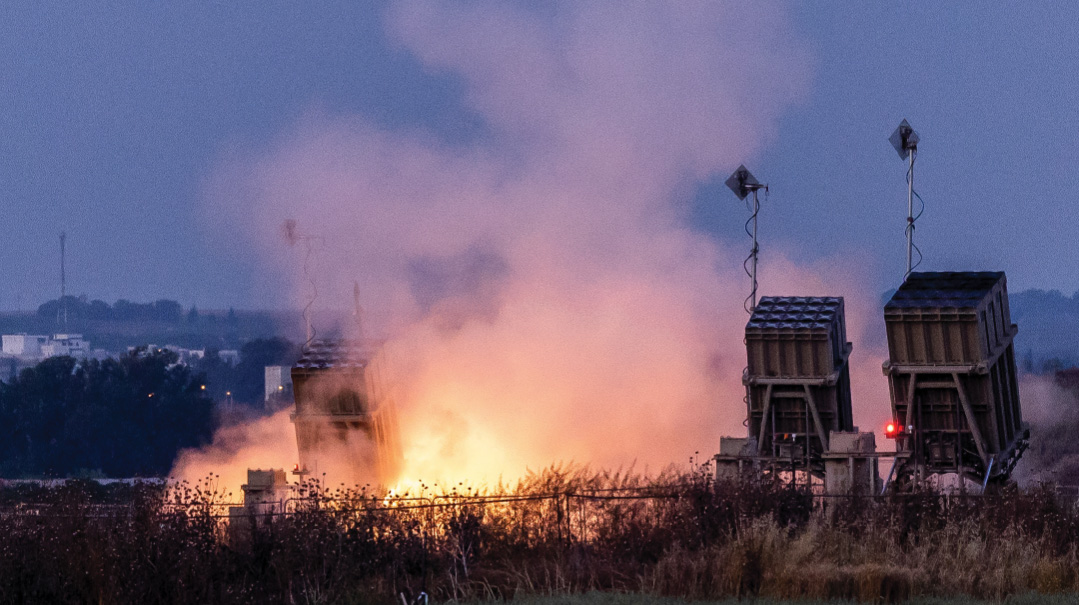
BOOM AND BUST Defense export success masks Israel’s domestic shortfalls in the low-tech basics like artillery shells (Photo: Flash90)
A
spat between Prime Minister Binyamin Netanyahu and the Biden administration that began last week over the rate of US arms shipments left Israel supporters perplexed. What actually happened? We don’t really know.
But late reports suggest there is some truth to both sides’ accounts. The US insists it hasn’t held anything up, but an unnamed American official confirmed that at a certain point a few months ago, the Pentagon stopped “fast-tracking” the arms deliveries. The whole episode has cast doubt on the defense procurement strategy that Israel has employed to date.
Professor Kobi Michael, senior researcher at the Institute for National Security Studies and the Misgav Institute, tells Mishpacha that although the US-Israel defense alliance is not in danger, there are definite underlying tensions.
“The US is the main arms supplier and is not boycotting Israel,” he explains. “There was a specific delay in the delivery of some 2,000-pound bombs, as a way to pressure Israel not to enter Rafah. But ultimately, Israel entered Rafah anyway.”
Professor Michael says although Netanyahu’s conflict with the Biden administration is partially political, there are also serious differences in strategic outlook. “There are significant gaps between the American and Israeli positions on the war in Gaza. Israel has made mistakes, and the prime minister has often publicized issues that should have remained private, but I believe the US has an erroneous understanding of the conflict. The US doesn’t understand Hamas and wants to believe a cease-fire will solve everything — the conflict with Hezbollah, with the Houthis, with Iran. They insist on ending the war in Gaza at any price, even to the extent of going against Israeli interests.”
This difference in outlooks has drawn attention to the way Israel spends the money it gets under its defense agreement with the US. Negotiated during the Obama administration, the deal gives Israel $3.8 billion a year for one decade — but requires Israel to purchase from American suppliers, effectively subsidizing the US defense industry.
Israel has chosen to allocate its purchases under the deal to such basic needs such as ammunition, artillery, and trucks, so that it can invest its own Defense Ministry budget in the country’s own high-tech sector.
But the combination of the drawn-out conflict in Gaza and the US ceasing its “fast-tracking” of ammunition and artillery deliveries to Israel has left the latter scrambling for this materiel from other suppliers. The problem there is that Israel finds itself competing in a tight market with other buyers — the US, for one, which is trying to supply Ukraine against Russia. But Taiwan is also trying to shore up its own weapons stores as China makes menacing moves.
“Israel closed its production lines because it was thought to be economically better to use US military aid to buy shells rather than produce them domestically,” says Professor Michael. “So now we find ourselves searching for the most basic munitions anywhere in the world we can buy them. This is one of the main lessons we are learning from this war. Gradually, local production has been reactivated, and the IDF will not only buy from the US but increasingly rely on its own national industry.”
His words are confirmed to an extent by a recent report from Israel’s Ministry of Defense, which announced that military exports reached $13.1 billion in 2023, a $600 million increase over the prior year. But most of those exports involve cutting-edge military technology; Israel is forced to import basic needs such as ammunition or shells. Ironically, as defense strategists tout new technological advances such as laser weapons, the multitude of international conflicts has created a shortage of primitive goods like bullets.
The industry periodical Defense News warns that the US cannot supply everything its allies demand. America has three conflicts in mind: Gaza, the war between Ukraine and Russia, and the potential conflict between China and Taiwan (with the latter beginning to occupy more attention).
Defense analysts speak of the “2024 ammo shortage,” which has led to a surge in prices for bullets and even gunpowder, with increases of between 7% and 10%. Indeed, when Russian president Vladimir Putin recently visited Kim Jong-un’s North Korea, some experts said Putin was looking for another arms supplier.
(As an aside, Defense News reported that 2023 also saw a $10.8 billion increase in nuclear weapons expenditures by the world’s nine major powers. The United States accounts for 80 percent of that figure.)
This new reality has forced the IDF to cut back on the amount of ammunition it uses in operations in Gaza, applying what military jargon calls “ammunition economy.” As Israel’s Defense Ministry seeks ammo suppliers in unexpected places, like Serbia, it demonstrates the critical need to reactivate its domestic arms industry.
A Holy City, Deserted
Chananel Shapira
A
ll of Israel’s north has come under the withering fire of Hezbollah rockets over the last few months — and worse awaits, if full-scale war breaks out. We wanted to take the pulse of one locale in Hezbollah’s sights: the holy city of Tzfas.
On our visit this week, Tzfas is as welcoming as ever, but the smell of last week’s fires have yet to subside, and the streets are practically deserted. The first thing that hits you is the smell, the acrid tang of smoke. Outwardly, nothing has changed — Tzfas still stands, with its centuries-old buildings, alleys, cemetery and other distinctive landmarks.
Residents are afraid to leave their homes, doing so only when necessary. After enduring several straight days of constant sirens and interceptions last week, they’re rightly reluctant to take any chances.
Our first stop is at the Ascent hostel, which stands on a picturesque corner of Old Tzfas. In ordinary times, it hosts thousands of visitors a year, some traveling alone and others in groups. The hostel offers guests various classes, workshops, and outdoor activities. Its owners, the Leiter family, we learn, are living with the war and its fallout every day.
“We’d had very little business” says Mrs. Leiter. “Since the outbreak of the war, the hostel has hosted about 20 soldiers, but there are very few guests besides them. Tourist groups are afraid to come, and very few individuals show up. The sad thing is that even the evacuees who initially came to us from Netivot, Be’er Sheva, and Ashkelon have already left, because they feel safer in the south than in Tzfas. This time of year is usually bustling with activity, but now our hostel, like every other hotel in Tzfas, is completely empty. It’s a very serious blow.”
Mrs. Leiter says the building, due to its age, cannot offer visitors the normal safety precautions that take effect whenever the air raid siren goes off. But Ascent does have other means of protection.
“Because our hotel is very old, there are no safe rooms,” she explains. “But we’ve found a way to protect ourselves — we have a special cave that was built 500 years ago, with walls over a meter thick. When the sirens go off, our guests gather in there.”
Tzfas famously abounds in tzimmerim (bed and breakfasts). They, too, stand empty and deserted.
“I can’t open the tzimmerim, even if someone begs me to,” explains Moti Cohen, owner of a tzimmer complex in Old Tzfas. “There are no shelters adjacent to the rooms, and I have nothing to offer guests during a siren. Besides, many of the museums and tourist sites in Tzfas are closed these days, as are the ones outside the city. So what are they going to come for?”
The financial loss has hit him hard, he says. “Before the war, our tzimmerim were full up every Shabbos, and sometimes during the week as well. I own three large tzimmerim — that’s how I make my living. For a while we hosted a family from Kiryat Shmona. The parents work in the area and were looking for a safe place to stay. But now even they’ve left, because Tzfas hardly meets the definition of a ‘safe place’ anymore.”
Only Divine Protection
For the Levy family, who live in the new city’s Neve Oranim neighborhood, life seems to be going on almost as usual.
“We try very hard not to panic the children,” explains the mother, Revital Simcha Levy. “Throughout this entire period, the situation hasn’t been easy. We hear Iron Dome interceptions all the time. Just recently, we woke up at 4 a.m. to the terrifying sound of an interception that caused a fire quite close to our house. But what we went through last week was on a different order of magnitude. There was a barrage on the city Shavuos morning, and the next day, Isru Chag, there were ten sirens in a matter of minutes, one after the other.”
Mrs. Levy notes that at that moment, the city’s children were all at school and had to be sent home immediately, but the parents couldn’t pick them up because the sirens were unrelenting.
“Since last weekend, there have been no more sirens, but a lot of fires have broken out throughout the area, Meron, Amuka, and Tzfas, as a result of interceptions,” she says. “All this is happening without sirens, which only undermines our sense of security more. Because if there’s no siren, then why are missiles falling?”
“The fear is very great,” agrees Rachel, who lives in Old Tzfas. “Although Tzfas isn’t really on the front line, it’s clear that the missiles are being aimed directly at us, and we’re completely unprotected. Most of us don’t have safe rooms, and the shelters are too far away. You don’t even feel safe going to the grocery store or the post office. When a siren goes off, people lie down on the ground close to walls.
“Not even a quarter of the residents here own firearms,” she says. “If there’s an infiltration here, like the one that took place in the south on Simchas Torah, Rachmana litzlan, the consequences could be horrifying.
“The hardest part is that no one seems to care about us,” she adds. “You get the sense that Tzfas isn’t on the map. It feels like there’s no one in the system we can trust. The only encouraging thing is the thought of all the tzaddikim buried in Tzfas, who are surely watching over us, and the tangible miracles we’ve seen. Last Thursday there were many direct launches at Tzfas with zero impacts. It’s clear that this place is under Divine protection.”
Rollercoaster
Indeed, Tzfas has seen numerous miracles since the outbreak of war, as residents of the city are quick to recount. We hear the same from Dr. Iris Leitersdorf, deputy director of the Ziv Medical Center.
“A few months ago a missile landed right here, at the entrance to the hospital, and no one was hurt,” she says, adding that it was a good exercise for the staff, who responded well.
“While Tzfas has made headlines in recent weeks, we’ve actually been in emergency mode since the outbreak of war on Simchas Torah,” she adds. “As soon as the war broke out in the south, it was clear that another front could very well open in the north, so we raised the alert level in accordance with Health Ministry directives. Since we were already in the process of reinforcing the building for an earthquake scenario, we managed to make the medical center relatively safe, with many of the wards reinforced, or at least two floors below the roof. So staying in them is relatively safe.”
Since the outbreak of the war, Dr. Leitersdorf says, about 240 wounded have been hospitalized in Ziv, some of them in serious and critical condition. “In recent weeks, we’ve mainly been treating fire and smoke inhalation victims, as a result of the many impacts that have occurred in the area.”
We ask her if the hospital is prepared for the scenario of a major escalation with Hezbollah.
“Yes, we do have extensive contingency plans in place, in cooperation with the Health Ministry, the Home Front Command, local authorities, and many other bodies,” she says. “We’ve taken into account that in the event of an escalation, we could lose contact for a certain amount of time, and we’ll have to manage on our own. We also constantly carry out drills to help that help us in real-world situations.”
But Dr. Leitersdorf emphasizes: “Despite our preparations, I am worried. I’ve already told our staff that a very challenging period lies ahead of us. It’s going to be a rollercoaster, we’ll have to hold on tight. But whatever the difficulty, we’ll do our utmost to function at our very best, and in the end we will emerge from this. Not because it will be easy, but because we’re ready, and we have faith that everything will turn out well.”
Leaving Isn’t an Option
And then there are the business owners who are fighting to stay afloat. Shmulik Bakshi, manager of the Tzfas B’Tnufa chain of local newspapers and a local business owner, explains: “The primary casualties currently are business owners and the self-employed, including myself. You can see on the ground that every time a siren sounds, people disappear from the street and all the shops close. There’s talk that some of the business owners will be compensated by the state, and our mayor, Yossi Kakon, is personally on the case. But it’s clear that not everyone will qualify, and it won’t be paid in full.
“Only 40 percent of Tzfas has safe rooms, and if a northern front opens, G-d forbid, we’ll find ourselves in a very bleak situation. The shelters in the city are nowhere near adequate, and the mobile shelters they’ve set up around the city don’t meet the demand. Most residents have nowhere to go during sirens. The danger is enormous.”
Despite these harrowing conditions, many Tzfas residents have stayed here. Bakshi has an answer as to why this is the case.
“You could put that down to the fact that actually, there have hardly been any direct hits on the city,” he says. “But I think the truth is that the residents derive a sense of security from the tzaddikim buried here. They rely on the Creator to save us. That’s not a slogan but the truth.”
Rabbi Kaplan, a Chabad shaliach in the city, adds another reason that people are staying: “We’re going through difficult days. We don’t even know what to hope for — a tense silence that will surely be followed by an explosion, or a burst of noise to be followed by real quiet.
“You have to consider that Tzfas serves not only its own residents, but is also a tourist attracts that draws visitors from around the world. We run institutions such as a yeshivah for the children of shluchim and a seminary for the girls, which attracts students from all over the world. The parents are very worried, and so are the students.
“But at the same time, it’s clear to us all that leaving isn’t an option. Once we’ve left, we’ve let the enemy win without firing a shot. So it’s true that it’s not easy, but it hasn’t always been easy before, and I say this as someone who was wounded in the First Lebanon War, and had my house and car destroyed. Yet we stayed, in the belief that it was the right thing to do. Our aspiration is to strengthen the city’s physical and spiritual Iron Dome and pray for better days.”
(Originally featured in Mishpacha, Issue 1017)
Oops! We could not locate your form.



